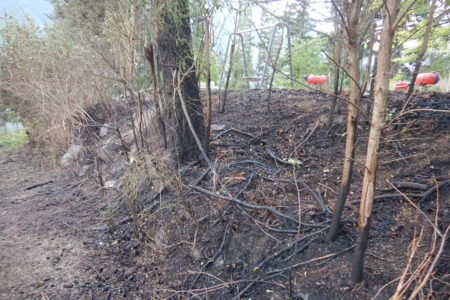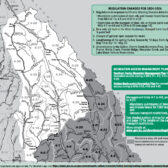Police Services director, consultant's report, recommended even more resources for Nelson Police Department
There is a further need for resources for the city’s police force beyond what the province’s director of Police Services already recommended, according to the recently released package of reports surrounding the March decision.
The reports — which included documents containing the decision — were released to the public on June 2, containing director Clayton Pecknold’s decision, city council and the Nelson Police Board’s submissions, and the consultant’s report from last fall.
On Feb. 17 Pecknold, handed down his ruling regarding the Nelson Police Board budget request to increase its Nelson Police Department staff by three positions (two police officers and one administrative position), which was previously not approved by council during the 2015 budget process.
Pecknold originally stated that the NPD budget be increased to provide for the addition of one police constable and one administrative position, and recommended that a review of the department’s service delivery model be completed before Nov. 30.
“However, it is equally clear to me that NPD is in need of further resources, perhaps even beyond those which were put forth within the 2015 budget,” Pechnold wrote.
He felt those additional resources would become apparent in the forthcoming review, which would include a multi-year staffing and resource plan.
The review would include an examination of positions, possible “civilianization” where appropriate and consistent with the collective agreement in place, review and renewal of partnerships with the RCMP and other agencies, as well as consideration of shared services with the city.
After research into the matter, the consultant hired by the province to conduct the review of the request, Peter Lepine, concluded that the NPD were “seriously challenged” with regard to staffing in their ability to successfully meet some of the overarching policing obligations.
In its own release, city council noted that a “full review of the department should have been completed prior to any requirement” to add additional staffing.
“The review by the consultant, (Peter) Lepine, identified a number of areas that should be looked at including bylaw, dispatch and the remand centre,” said Mayor Deb Kozak.
“As a small municipal force in a sea of RCMP, we need to open the box and be creative in how we deliver policing into the future. This review will give us that opportunity.”
NPD police chief Paul Burkart said the review would look not only at department operations and the present positions in the department, but will look for efficiencies with the city and with the NPD’s community partners, including the RCMP.
“With this information, the board will then formulate a resource and staffing plan for the future,” he said. “The review will ensure that Nelson citizens are continuing to receive the best value for their tax dollars and that the department is running as efficiently as possible.”
The police board has given assurances it can manage the recommendations within the current 2016 budget, but will face financial pressure on the budget in 2017.
Digging into the report
In conducting the original review of the request, Peter Lepine looked at staffing statistics for 14 police forces with populations similar to Nelson, some municipal and some RCMP, and concluded that Nelson sits close to the average in terms of officer numbers, crime rate, case load, and population per officer, and that an additional two officers wouldn’t change that. It would, however, improve the department’s functioning, he wrote.
It was the consultant’s view that there was little to no formal crime reduction strategy that would enable the NPD to be viewed as an intelligence-led organization — a police force’s ability to collect and process information.
“Despite the fact that the NPD has included this policing strategy as deliverable … their current capacity does not permit it to conduct the majority of activities that would permit them to deal with policing issues in an intelligence-led manner,” Lepine wrote.
In addition, Lepine felt that unless a specific opportunity was created to mitigate the ongoing pressure of mandatory training, the current policing standards “will not be met by the employees of the NPD.”
He also noted that — due to low staffing levels — there was a high risk associated to the manner in which the duty of prisoner monitoring was conducted.
The city’s police force is almost entirely focused on a response-only model of policing. As a result, Lepine felt the NPD was incapable of meeting challenges in the areas of proactive policing, intelligence-led policing and challenges in meeting certain current and future policing standards with its current resources.
Although the NPD is delivering an “acceptable” level of service — according to the community and council — there was little desire by city council to provide the department with additional resources “without being significantly convinced that they are in fact required.”
“It is the consultant’s view that changes to the status quo are required even if one were to expect the status quo ‘response-only’ policing model to remain into the future,” Lepine said.
In his report, the consultant approved the entire board request of two officers and one administrative coordinator position. Lepine also suggested moving the bylaw enforcement program from under the NPD’s jurisdiction over to another city department to offer some relief from some of the overall police-related workload.
He also recommended that the revenues obtained from keeping of remand prisoners awaiting court or transfer be used to hire guards to appropriately oversee the guarding of prisoners.
He recommended a review to determine whether efficiencies might be found within the NPD by contracting their police dispatching service to an outside service provider.
He advised there was no need for further inspection to justify the board’s request for specific resources, and that there was “sufficient information and statistical data contained in this report to allow the director to decide on the board’s request.”
Lepine also suggested the city conduct a review of its own on what contracting the RCMP could bring to the city if they were to be considered as the police service of choice.
Lepine recommended that all agreements between the NPD and the RCMP created before the year 2012 be evaluated for relevancy, and refreshed in order to better reflect the current policing environment. He also recommended the same process be undertaken between the NPD and B.C. Corrections and review and refresh the memorandum of understanding.
The Nelson police operate Corrections BC’s jail facility and remand centre. Lepine writes that police staffing levels don’t allow adequate supervision of prisoners and are therefore a risk, straining resources.
Council does its own digging
At the time of the review, city council contended that the police board request for additional staffing was a “statistical exercise” and was based on staffing in other B.C. municipalities that were very different than Nelson, but, like Nelson, were policed by independent police forces.
Nelson was unique in that it was the only independent municipal police department in a community of less than 15,000 residents, council’s argument went on.
“The board has never stated what service level improvements or policing goals that additional staffing would provide,” read the report from city council.
The Police Board Strategic Plan does not identify what staffing levels are necessary to achieve strategic goals or outcomes, the report added.
“The board has also never identified what they believe the adequate staffing levels are and have identified a range of staffing from 17 in 2014 to as many as 24-25,” council noted.
In performing its own research, city council found that current Nelson police staffing levels “meet or exceed those of other jurisdictions.”
City council questioned the board’s contention that, although current city costs per officer are identical to the RCMP and staffing levels are lower elsewhere, the city department needed higher staffing levels.
Council also questioned the use of a provincial government official over a local elected governing body.
“Council is the ultimate voice of the community and should be the level of government that sets service levels in the community,” the release stated. “It should be in extraordinary circumstances that the province should step into council’s role.
It was a universal sentiment across council that it was “meeting its obligation under the Police Act based on the research that it has completed.”
Just the facts, Ma’am
In the report, the board stated its case in that it was concerned the NPD is “currently only capable of being a reactive police agency with no capacity to be proactive,” with officers unable to meet mandatory training standards unless they are prepared to conduct their training on their days off.
With the population within the city increasing by approximately 50 per cent during the daytime hours, the board was concerned the NPD were unable to staff to meet the workload that comes with this fluctuation.
The only way the department could meet the daytime pressures was to reply on the single community policing officer or the single general investigation section officer to “drop what they are doing and respond to a call for service.”
While this spoke to the public’s perception that the NPD was able to tend to calls for service in a timely manner, the work being done by these officers was neglected, the consultant found.
Finding the bottom line
Pecknold was charged with making a declaration on the minimal staffing required in Nelson under the B.C. Police Act, after the Nelson Police Department’s budget request for $311,000 — for two additional officers and one administrative position — was denied by city council last fall.
The NPD request cited an increase in workload as the reason for the staffing increase.
The consultant’s review began when the Nelson police board voted to appeal city council’s decision to deny the extra funds to the province under a rarely used provision of the B.C. Police Act.
As it stands, the NPD’s approximately $4-million budget makes up 22 per cent of the city’s budget. However, the police have not added any officers in over 20 years and former chief constable Wayne Holland had explained to council that the workload for NPD officers — particularly the handling of mental health cases — had increased in the last few years.
A consultant hired by Pecknold to author an audit of the NPD’s request filed his report last October. Peter Lepine’s audit examining police staffing in Nelson was reviewed by Nelson city council and the Nelson police board, with final comments on the findings submitted back to the province in November.
The documents were released to the public last week following a review by City of Nelson, Nelson Police Department and Police Services’ staff for content that cannot be released under the Freedom of Information and Protection of Privacy Act.



























